Related Research Articles

The University of Missouri System is an American state university system providing centralized administration for four universities, a health care system, an extension program, and ten research and technology parks. Over 61,500 students are currently enrolled at its four campuses. The health care system operates several hospitals and clinics in central Missouri, while the extension program provides distance learning and other educational initiatives statewide.
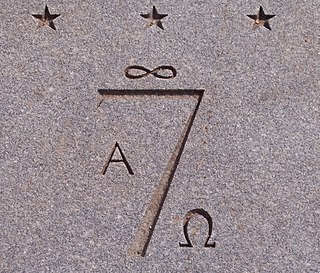
The Seven Society is the most secretive of the University of Virginia's secret societies. Members are only revealed after their death, when a wreath of black magnolias in the shape of a "7" is placed at the gravesite, the bell tower of the University Chapel chimes at seven-second intervals on the seventh dissonant chord when it is seven past the hour, and a notice is published in the university's Alumni News, and often in the Cavalier Daily. The most visible tradition of the society is the painting of the logo of the society, the number 7 surrounded by the signs for alpha (A), omega (Ω), and infinity (∞), and sometimes several stars, upon many buildings around the grounds of the university.

Mizzou Arena is an indoor arena located on the campus of the University of Missouri in Columbia, Missouri. Home to the school's men's and women's basketball teams, the facility opened in November 2004 and replaced the Hearnes Center as the school's flagship indoor sports facility. The arena also serves as the Columbia-Jefferson City market's venue for well-known 'arena' acts such as Rascal Flatts, Luke Bryan and the Eagles. The arched-roof building seats 15,061, and is located just south of Hearnes and Memorial Stadium. The arena is host to Missouri State High School Activities Association championships for basketball and wrestling. The arena was originally known as Paige Sports Arena.

The Maneater is the official, editorially independent student news publication of the University of Missouri. The Maneater editorial and advertising staffs are composed entirely of students, with the exception of a professional business adviser. Financially, The Maneater is a non-profit publication funded by advertisers. The newspaper is distributed free of charge, and all aspects of its website remain accessible at no cost to readers. The editorial department of The Maneater remains independent from any student governments and organizations, as well as the Missouri School of Journalism and university itself.

In the United States, an honor society is an organization that recognizes individuals who rank above a set standard in various domains such as academics, leadership, and other personal achievements, not all of which are based on ranking systems. These societies acknowledge excellence among peers in diverse fields and circumstances. The Order of the Arrow, for example, is the National Honor Society of the Boy Scouts of America. While the term commonly refers to scholastic honor societies, which primarily acknowledge students who excel academically or as leaders among their peers, it also applies to other types of societies.
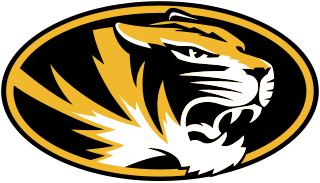
The Missouri Tigers intercollegiate athletics programs represent the University of Missouri, located in Columbia. The name comes from a band of armed Union Home Guards called the Fighting Tigers of Columbia who, in 1864, protected Columbia from Confederate guerrillas during the American Civil War.
Secret societies have been a part of University of Virginia student life since the first class of students in 1825. While the number of societies peaked during the 75 years between 1875 and 1950, there are several newer societies and six societies that have been active for more than 100 years, including Seven Society, Z Society, IMP Society, Eli Banana, T.I.L.K.A. Society, and The 13 Society. The earliest societies, Eli Banana and T.I.L.K.A. Society, function as social clubs, while the Z Society, IMP Society, and Seven Society have a record of philanthropy and contribution to the university. Some of the more recent societies focus on the recognition or disapprobation of positive and negative contributions to the university.

Omicron Delta Kappa (ΟΔΚ), also known as The Circle and ODK, is an honor society located in the United States with chapters at more than 300 college campuses. It was founded on December 3, 1914, at Washington and Lee University in Lexington, Virginia, by fifteen student and faculty leaders. The society recognizes achievement in five areas: scholarship; athletics; campus and community service, social or religious activities, and campus government; journalism, speech, and the mass media; and creative and performing arts. Some circles of ΟΔΚ are quasi-secret, in that newly selected members remain undisclosed for some time.

QEBH is a senior honor society at the University of Missouri. Founded in 1898, it is the oldest of six recognized secret honor societies that participate in the annual tradition of Tap Day on campus. The meaning of the society's name is known only to the members.
There are many collegiate secret societies in North America. They vary greatly in their level of secrecy and the degree of independence from their universities. A collegiate secret society makes a significant effort to keep affairs, membership rolls, signs of recognition, initiation, or other aspects secret from the public.
Welch Hall is a historic residence located at 24 E Stewart Rd on Oak Hill in Columbia, Missouri. The residence is home to the University of Missouri chapter of Sigma Alpha Epsilon. The site was recognized by the Columbia Historic Preservation Commission as one of the city's Most Notable Historic Properties in 2004. It was nominated for the National Register of Historic Places in 2014.
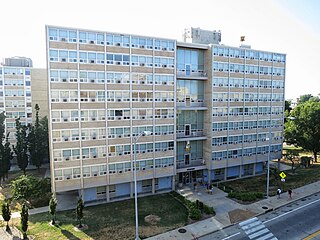
Laws Hall was a residence hall at the University of Missouri. Located at the corner of Tiger Avenue and Kentucky Boulevard, Laws comprised a gross area of 72,871 square feet (6,769.9 m2) over 9 floors and basement area. The street address was 1005 Tiger Ave. 65201. The structure was constructed in 1957 as a women's residence hall. Eventually made a co-education residence hall, Laws housed students until the end of the 2015-2016 academic year. The building was demolished in March 2017 as part the final phase of the university's residence halls master plan.

Jesse Hall, formerly New Academic Hall, is the main administration building for the University of Missouri. Its dome has towered 180 feet (55 m) above the south end of David R. Francis Quadrangle since its completion in 1895. In the lawn in front of Jesse Hall are The Columns, all that remains of its predecessor Academic Hall, which was destroyed by fire in 1892. The building contains the office of the chancellor, university registrar, graduate school, admissions, and financial aid. One of the most photographic landmarks in Missouri, the building was designed by Missouri architect Morris Frederick Bell, and is his largest surviving work. Jesse Auditorium had hosted graduations and many university functions over the years. The University Concert Series presents national and international concerts, Broadway shows, performers, bands, speakers, and theater to the largest auditorium in Columbia. As the former home of the School of Music, student performances occasionally take place. The building is the most prominent contributing structure to the David R. Francis Quadrangle National Register of Historic Places District. In 1922, "New Academic Hall" was renamed "Jesse Hall" in honor of retiring University President Richard Henry Jesse.
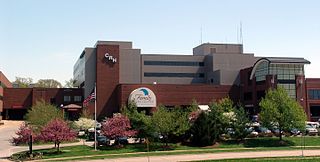
The University of Missouri Women's Hospital, formerly University of Missouri Women's Hospital, is the only hospital in Missouri exclusively dedicated to the health of women. The hospital was formerly home to MU Children's Hospital, and is currently home to MU Women's Center, and the Family Birth Center. The Women's Hospital no longer has a pediatric Emergency Room and inpatient services, having moved to University Hospital. In Fiscal Year 2009, 1,793 babies were born in the Family Birth Center. The hospital has the da Vinci minimally invasive surgical robotic system. It is located in eastern Columbia near the interchange of Interstate 70 and U.S. 63 at 404 North Keene Street.
Switzler Hall is an academic hall on the campus of the University of Missouri in Columbia, Missouri. The building was completed in 1872, and it is located on the west side of the David R. Francis Quadrangle. Switzler Hall is the oldest academic building and second oldest structure on campus after the Chancellor's Residence. The building was named after Colonel William Franklin Switzler, editor and publisher of the Missouri Statesman and supporter of the University. Today the building houses the Department of Communication, Women's and Gender Studies, and the Special Degrees Program. The building is listed on the National Register of Historic Places.
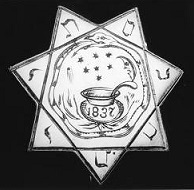
The Mystical Seven was a society founded in 1837 at Wesleyan University in Middletown, Connecticut. Members were called Mystics. The society died in 1890, with its surviving temples merging into other national fraternities. It was restarted as a local honorary at Wesleyan University in the late 19th century.

Mystical Seven (M7) is one of the secret societies of the University of Missouri. Mystical Seven chooses seven outstanding seniors for membership based on their good deeds and selfless leadership and service to the campus and community. Mystical Seven is the second oldest of the secret honor societies at the university. It has a rivalry with QEBH. Other secret societies on campus include LSV, Rollins Society, Omicron Delta Kappa, and Mortar Board.

The University of Missouri is a public land-grant research university in Columbia, Missouri. It is Missouri's largest university and the flagship of the four-campus University of Missouri System. MU was founded in 1839 as the first public university west of the Mississippi River. It has been a member of the Association of American Universities since 1908 and is classified among "R1: Doctoral Universities – Very high research activity."

In 2015, a series of protests at the University of Missouri related to race, workplace benefits, and leadership resulted in the resignations of the president of the University of Missouri System and the chancellor of the flagship Columbia campus. The moves came after a series of events that included a hunger strike by a student and a boycott by the football team. The movement was primarily led by a student group named Concerned Student 1950, referencing the first year black students were allowed to enroll in the university. The movement and protests were documented in two films, one made by MU student journalists and the other, 2 Fists Up, by Spike Lee. While it is alleged that bad publicity from the protests has led to dropping enrollment and cutbacks, others have cited budget cuts issued from the state legislature.

Michael Joseph Budds was an American musicologist, and longtime professor, at the University of Missouri in Columbia, Missouri. In addition to teaching, he wrote and edited a number of works, including a widely used textbook on American popular music. Also a philanthropist, he established the Budds Center for American Music Studies at the University of Missouri School of Music where he taught. He was the first musicologist inducted into the Missouri Music Hall of Fame. Budds taught at Missouri for 37 years, until his death on November 19, 2020.
References
- 1 2 Felberbaum, Michael (2000-04-18). "Honorary societies on tap". The Maneater. Archived from the original on February 9, 2012. Retrieved 2013-08-21– via Internet Archive.
- 1 2 3 "UMC Sudents Receive Honors". Eldon Advertiser. Eldon, Missouri. 1985-05-16. p. 3. Retrieved 2024-04-06– via Newspapers.com.
- 1 2 "11 Students, 3 Professors Tapped into Secret Honorary Societies". Missouri School of Journalism | University of Missouri. 2015-05-18. Retrieved 2024-04-06.
- ↑ Davis, Chase (April 12, 2002). "What the Fudge?: Tap Day". The Maneater. Archived from the original on February 9, 2012. Retrieved 2013-08-21.
- 1 2 3 Colletto, Anna (2016-04-24). "Secret societies LSV and Mystical 7 call out injustices at MU on Tap Day". The Maneater. Retrieved 2024-04-06.
- 1 2 "Tap Day". Student Affairs | University of Missouri. 2024. Retrieved 2024-04-06.
- 1 2 "MU Sinclair School of Nursing Student Recognized Multiple Times During His Mizzou Career For Outstanding Service". Sinclair School of Nursing, University of Missouri Columbia. May 8, 2008. Archived from the original on 2008-06-01. Retrieved 2008-05-31.
- 1 2 Montanez, Shannon (2009-04-20). "Secret societies reveal new members on Tap Day". The Maneater. Archived from the original on April 25, 2011. Retrieved 2013-08-21– via Internet Archive.
- ↑ Guardado, Elmer (2016-04-22). "MU secret societies welcome new members on Tap Day". Columbia Missourian. Retrieved 2024-04-06.